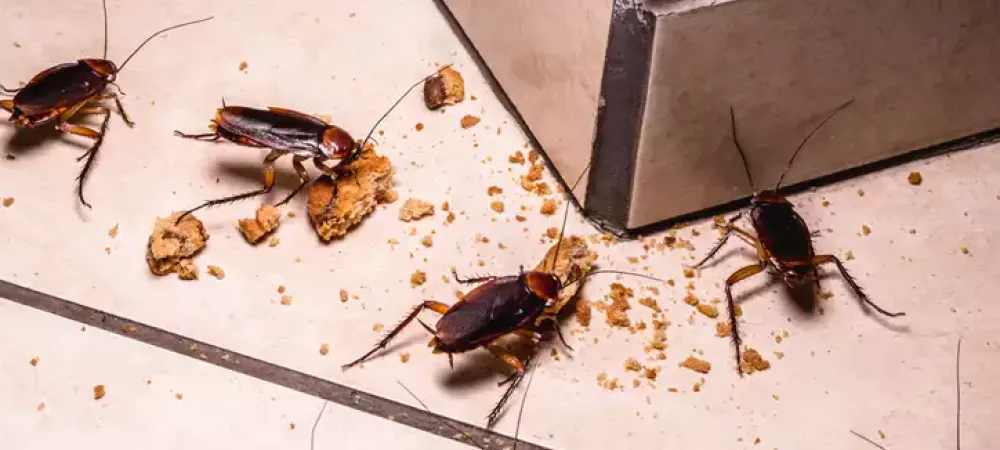Top 6 Annoying Florida Bugs & How to Control

Florida’s tropical climate is not only a paradise for its residents but also a perfect breeding ground for all kinds of pests. From cockroaches to mosquitoes, these bugs can make daily life frustrating for homeowners. In this blog, we’ll explore the six most annoying bugs in Florida, and more importantly, share expert tips on how to keep them under control.
1. Pillbugs and Sowbugs: Florida’s Moisture-Loving Pests
Pillbugs and sowbugs are commonly found in Florida’s damp environments, typically under rocks, mulch, or garden debris. While they are harmless to humans, they can invade homes in large numbers, making them quite a nuisance.
- Behavior: Pillbugs and sowbugs thrive on decaying organic material, making them common in gardens and outdoor spaces. They require moisture to survive, which explains their tendency to seek out damp, dark places.
- Prevention: Eliminate moisture around your home by fixing leaks, ensuring proper drainage, and using landscaping to minimize wet spots. Seal any cracks around doors and windows where they could gain entry.
- Management: If they find their way inside, vacuuming is an easy solution. For long-term control, reducing moisture levels both indoors and outdoors is crucial.
2. Centipedes and Millipedes: Scary but Harmless Bugs
Centipedes and millipedes often startle homeowners due to their many legs and fast movements, but they’re mostly harmless. Centipedes are beneficial predators that consume other insects, while millipedes are primarily decomposers of plant material.
- Behavior: Centipedes are active hunters at night, preying on smaller insects, while millipedes tend to invade homes when outdoor conditions become unfavorable, such as during heavy rains.
- Prevention: Reducing moisture and maintaining a clean environment are key to keeping them out. Make sure to seal cracks around the foundation and keep garden debris away from your home.
- Management: If you find them indoors, removing them with a vacuum or catching them manually is effective. For larger infestations, a pest control service may be necessary to ensure they are properly managed.
3. Earwigs: Are They Really a Threat to Your Home?
Despite their fearsome appearance, earwigs are mostly harmless to people. However, they can become a nuisance in large numbers, especially in humid Florida environments.
- Behavior: Earwigs are nocturnal and prefer damp, dark environments, feeding on organic matter, including decaying plants and other insects.
- Prevention: To prevent earwigs, reduce moisture inside your home by fixing any leaks and using dehumidifiers in basements or bathrooms. Clearing out garden debris near your foundation is also helpful.
- Management: Earwigs can be easily removed by hand or vacuumed up. Pest control professionals can offer long-term solutions to keep populations at bay if they become overwhelming.
4. Mosquitoes: Florida’s Biggest Summer Annoyance
Florida’s warm climate makes it a breeding ground for mosquitoes, which can not only be irritating but also dangerous as they spread diseases like Zika, West Nile Virus, and Dengue.
- Behavior: Mosquitoes breed in standing water, so any puddles, birdbaths, or containers left out during the rainy season can become mosquito breeding grounds.
- Prevention: Eliminate standing water around your home and use mosquito repellents or mosquito nets when spending time outdoors. Installing screens on windows and doors can also help keep them out of your house.
-
Management: For serious infestations, professional pest control services can apply treatments around your property. In addition, local mosquito control programs can help mitigate large outbreaks, especially during the summer months.
5. Biting Midges (No-See-Ums): Tiny Pests, Big Problems
Though small in size, biting midges (commonly known as no-see-ums) can cause irritating, itchy bites. These pests are especially prevalent near water bodies and are most active during the early morning and evening.
- Behavior: No-see-ums are attracted to water, and they thrive in the marshy environments often found around Florida's lakes, rivers, and coastal regions. Their bites are painful and can cause allergic reactions in some people.
- Prevention: Protect yourself by using insect repellent and wearing long sleeves when outdoors, especially around dawn and dusk. Install fine mesh screens on your windows to keep these tiny pests out.
- Management: Professional pest control services can help by targeting their breeding areas with specialized treatments. Additionally, reducing outdoor lighting can minimize their presence, as they are attracted to light.
6. Cockroaches (Palmetto Bugs): Florida’s Persistent Pest
Cockroaches, especially the large palmetto bugs, are a notorious pest in Florida. Known for their resilience, these pests thrive in warm, humid conditions and are commonly found in kitchens and bathrooms.
- Behavior: Cockroaches are nocturnal and prefer dark, moist environments. They can contaminate food, spread bacteria, and trigger allergies, making them a health hazard in addition to being unsightly.
- Prevention: To prevent cockroach infestations, seal cracks and crevices around your home, store food in airtight containers, and clean up spills immediately. Regularly take out the trash and keep moisture-prone areas dry.
- Management: Cockroach infestations can be difficult to manage on your own. Professional pest control services, like those provided by Blue Door Pest Control, can help by targeting entry points and using safe, effective treatments to eliminate them.
Honorable Mention: Pantry Bugs
Although not a specific type of bug, various pantry pests such as flour beetles and grain moths can infest stored food in Florida homes. These pests often invade kitchens and can contaminate dry goods like flour, cereals, and grains.
- Prevention: Store dry goods in airtight containers and regularly check for signs of infestation, such as small bugs or webbing. Keep your pantry clean and regularly inspect food items before use.
- Management: If you spot pantry bugs, immediately dispose of any contaminated food and clean the area thoroughly. Professional pest control services can assist in ensuring the infestation doesn’t spread.
Conclusion:
Florida’s warm climate is a perfect environment for many annoying pests. By understanding their behaviors and implementing the right prevention strategies, you can protect your home from these bugs. However, when infestations become too overwhelming, professional pest control is the most effective solution.
For reliable and effective pest management, contact Blue Door Pest Control. We specialize in controlling Florida’s toughest pests and ensuring that your home remains pest-free throughout the year.
